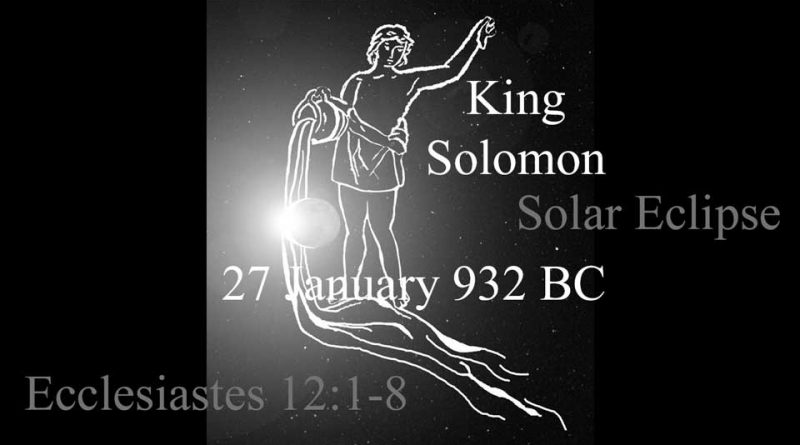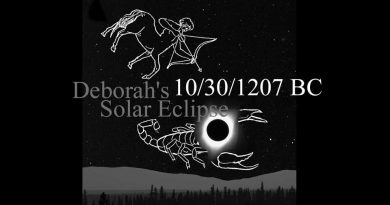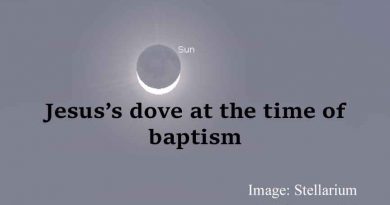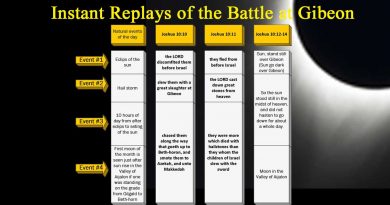King Solomon Solar Eclipse 27 January 932 BC
On January 27, 932 BC, a substantial solar eclipse occurred directly over King Solomon in Jerusalem. The eclipse occurred at the end of the tenth month with only two months left. The solar eclipse occurred around the tenth hour of the day and appeared to have removed 10/12 of the sun.
The eclipse was witnessed by all Israel and the Prophet Ahijah, who began prophesying about God’s desire for Israel. Prophet Ahijah interpreted that the eclipse occurred when 10/12 months of the year are over, in the tenth hour of their twelve-hour day, and he also observed that the solar eclipse removed 10/12 of the sun from the sky.[1] The Prophet Ahijah saw no stars except for two planets during the event. After pondering this event, Ahijah prophesied that just as 10/12 of the months of the year are over, as 10/12 of the sun would not shine after 10/12 hours of the day was gone, so also 10 of the 12 tribes will be torn away from King Solomon’s son. The Prophet Ahijah emphasized this by taking his cloak, cutting it into 12 pieces, and then telling Jeroboam to take 10 for himself. The Prophet Ahijah interpreted the sun had two parts left, the day had two hours left, two months of the year remained, and two planets were showing in the sky, so he concluded that two tribes, Judah and Benjamin, would remain under King Solomon’s son’s rulership’s.
King Solomon refused to believe that God would tear away part of the kingdom and give them to Jeroboam. Solomon said, “Consider the work of God: for who can make that straight, which he hath made crooked? In the day of prosperity be joyful, and in the day of adversity consider; yea, God hath appointed the one as well as the other, to the end that man should not find out anything that shall be after him. All this have I seen in my days of vanity: there is a righteous man that perisheth in his righteousness, and there is a wicked man that prolongeth his life in his evil-doing” (Ecclesiastes 7:13-15). Looking at the critical points in his statement, God’s plan for Israel and Solomon’s resistance can be seen.
King Solomon starts with the statement, “Consider the work of God.” Hence, he is contemplating a work that God has or will perform. The statement, “For who can make that straight, which he has made crooked?”, parallels King Solomon’s long years of kingship over Israel only to have God promise to remove it from his family line—or to make crooked.
The Scripture portion saying, “In the day of adversary consider; yea, God has appointed the one as well as the other,” parallels the fact that God appointed Solomon to be a king, but now has God appointing “the other,” being Jeroboam. The next portion gives us a sense of despair: “Man should not find out anything that shall be after him.” God told King Solomon that his servant Jeroboam would become king after him. However, Solomon is attempting to change the future by ordering the death of Jeroboam. His conflict is highlighted in the passage that says, “Man should not find out anything that shall be after him.” This is highlighted in 1 Kings 11:40 when King Solomon resisted God and actively tried to kill Jeroboam, the man God had appointed. The final portion of Scripture of note: “There is a righteous man that perisheth in his righteousness, and there is a wicked man that prolongeth his life in his evil-doing.” Two people are involved: one that is wise and one that is wicked. One can deduce that King Solomon believes himself to be the just man who perishes in his righteousness; one can equally deduce that Jeroboam is the wicked man who prolongs life in his wickedness. This is not the sign of a man accepting what God said, but rather one fighting against God.
King Solomon witnessed the solar eclipse but insisted it occurred over everyone, not just himself. King Solomon’s thoughts on this can be found in Ecclesiastes 2:12-16, “I turned myself to behold wisdom, and madness, and folly: for what can the man do that cometh after the king? Even that which hath been done long ago. Then I saw that wisdom excelleth folly, as far as light excelleth darkness. The wise man’s eyes are in his head, and the fool walketh in darkness: and yet I perceived that one event happeneth to them all. Then said I in my heart, as it happeneth to the fool, so will it happen even to me; and why was I then more wise? Then said I in my heart, that this also is vanity. For of the wise man, even as of the fool, there is no remembrance for ever; seeing that in the days to come all will have been long forgotten. And how doth the wise man die even as the fool!”
King Solomon’s contemplation on this event leads him to say, “I saw that wisdom excelleth folly, as far as light excelleth darkness. The wise man’s eyes are in his head, and the fool walketh in darkness: and yet I perceived that one event happeneth to them all. Then said I in my heart, as it happeneth to the fool, so will it happen even to me.” King Solomon compares himself to wisdom walking in the light and Jeroboam to the fool walking in the darkness. This is interesting, seeing that the sun’s darkness represents the ten tribes taken away, and the sunlight represents King Solomon’s two tribes.
King Solomon then compares his walk in the light as having his eyes where they belong, whereas Jeroboam’s eyes are in the eclipse’s darkness, hence not using his eyes but rather his emotions. King Solomon’s experience is wrapped up with this statement: “And yet I perceived that one event happeneth to them all.” King Solomon’s own words inform us that this solar eclipse covers not just himself but everyone. Therefore, God was not talking to just him but everyone. King Solomon concluded that if the total solar eclipse occurred over everyone, why would it be a judgment only against him?
King Solomon concludes the book of Ecclesiastes with a quick summary of the last year of his life.
Ecclesiastes 12:1-8 – “Remember also thy Creator in the days of thy youth, before the evil days come, and the years draw nigh, when thou shalt say, I have no pleasure in them; before the sun, and the light, and the moon, and the stars, are darkened, and the clouds return after the rain; in the day when the keepers of the house shall tremble, and the strong men shall bow themselves, and the grinders cease because they are few, and those that look out of the windows shall be darkened, and the doors shall be shut in the street; when the sound of the grinding is low, and one shall rise up at the voice of a bird, and all the daughters of music shall be brought low; yea, they shall be afraid of that which is high, and terrors shall be in the way; and the almond-tree shall blossom, and the grasshopper shall be a burden, and desire shall fail; because man goeth to his everlasting home, and the mourners go about the streets: before the silver cord is severed, or the golden bowl is broken, or the pitcher is broken at the fountain, or the wheel broken at the cistern, and the dust returneth to the earth as it was, and the spirit returneth unto God who gave it. Vanity of vanities, said the Preacher; all is vanity.”
Solomon encourages everyone to remember God in the early parts of their life. Then goes on to say, “Before the evil days come, and the years draw nigh, when thou shalt say, ‘I have no pleasure in them.’” King Solomon’s words imply that his days of trouble came not because of sin but would have happened regardless.
King Solomon then describes “the evil days” as “the sun, and the light, and the moon, and the stars, are darkened.” The description of the sun, light, moon, and stars growing dark referred to the solar eclipse. The eclipse caused the sun to be 10/12 blocked, the light was 10/12 dimmer than its normal strength, the moon was nowhere to be seen as it was blocking the sun, and the only stars visible were Venus and Jupiter.
The impact of the solar eclipse is described: “When the keepers of the house shall tremble, and the strong men shall bow themselves, and the grinders cease because they are few, and those that look out of the windows shall be darkened, and the doors shall be shut in the street; when the sound of the grinding is low.” The trembling keepers could refer to Jeroboam running away to Egypt. With Jeroboam rebelling against King Solomon, he could have inspired others to rebel as well. Indeed, King Solomon informs us that all work ceased and no one was moving about. It is unclear whether Israel is hiding in place or they left, possibly with Jeroboam.
King Solomon then describes the time of year: “The almond-tree shall blossom, and the grasshopper shall be a burden, and desire shall fail.” The season is described in this statement. The almond tree blossoms between early January and late February. At the same time, January to February is when grasshoppers are known to migrate through the territory.
King Solomon describes the solar eclipse by saying, “The silver cord is severed, or the golden bowl is broken, or the pitcher is broken at the fountain, or the wheel broken at the cistern.” The month of Aquarius occurs around January to February and is represented by a constellation representing a person with a big bowl pouring water out. The month of Aquarius is the year’s rainiest time; therefore, rain is associated with the constellation. The symbology of Aquarius pouring out this life-giving waterfall—represented in a line of over 20 stars—could be described as a silver cord. The solar eclipse covering King Solomon occurred during the month of Aquarius within the water falling from the golden bowl. The solar eclipse within the constellation’s waterfall is described as a severed silver cord of water poured from a golden bowl.
King Solomon expresses his frustration with this solar eclipse, “Vanity of vanities, said the Preacher; all is vanity!”
[1] Warning: looking at the sun without appropriate safety equipment is dangerous and can result in permanent eye damage causing loss of sight.




